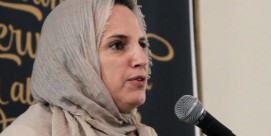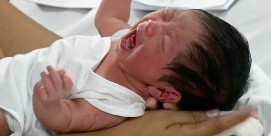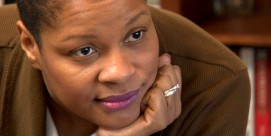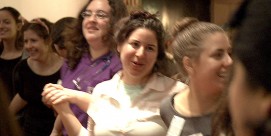In This Episode << SLIDE LEFT TO SEE ADDITIONAL SEGMENTS
Kathleen Norris Interview
Read more of Bob Abernethy’s September 16, 2008 interview with Kathleen Norris, author of ACEDIA & ME: A MARRIAGE, MONKS, AND A WRITER’S LIFE, in Washington, DC:
Q: Let’s start out with “acedia.” What is it?
A: It’s an ancient word that basically means the inability to care, even to the extent that you can’t care that you don’t care anymore. It’s sort of a really drastic, nasty form of indifference.
Q: It’s not depression?
A: Not exactly. There really are distinctions. One of the things I had to tackle in writing this book was to talk about why depression is not exactly the same as acedia, even though it shares a lot of the same symptoms, and I believe that depression is a medical condition — clinical depression — that can be treated by medicine and therapy and a number of — there are a number of ways to treat it. But acedia is something, I think, that’s just more common. Most of us probably have experienced it in some form or another. When you’re totally restless and totally bored but can’t think of anything that you want to do, or you are restless in another way and you try to escape from it by becoming hyperactive, being a workaholic, that’s another form that acedia takes.
Q: It sounds as if it covers a whole lot of things, but tell about your own experience with it. What have you felt?
A: Acedia just sort of will creep up on me. If I’m depressed, I tend to know the reasons why. There tends to be something I can point to in my life in saying of course I’m depressed, this has happened. You know, my father is dying, or my husband is dying, or something really drastic is going on in my life, and there’s a reason why I’m depressed. With acedia, there’s no cause. It just sort of pops up, and I might wake up in the morning thinking, “Oh, this is gonna be a good day,” and then all of a sudden the thought, “No, it won’t be, and maybe I shouldn’t get out of bed.” There’s no reason to get out of bed. Or if I do get out of bed, instead of going to read a good book, I’ll watch “America’s Next Top Model” or something and, you know, throwing me off things I either really know I want to do, or ought to do, whatever. It sort of throws me off, and that’s one of my common, I guess probably my most common, experience of that is that just really sour mood that just takes hold for no reason at all.
Q: But you’ve indicated that it’s more than that. It’s a spiritual problem that you liken to sin.
A: Well, I tend not to use the word “sin.” I really prefer — because there’s so much baggage with that, and so many people think when you use the word “sin” when it comes to acedia or depression you’re trying to make people feel guilty about being mentally ill, which is crazy. You shouldn’t do that, or you’re, you know, so I tend not to use the word “sin.” The word I prefer is what the ancient monks used, which is “bad thoughts,” because we all have bad thoughts. We all have temptations, and that’s a much more useful designation than the word “sin.”
Q: And it began a long time ago for you?
A: Well, really, probably in adolescence, and this was one of the reasons I wrote the book was because, all of a sudden, I was looking at this book by a fourth-century monk, and he was basically describing an experience that I’d had at the age of 15, or first had at the age of 15, and I read this passage, where he just — a monk named Evagrius, he was describing something I knew very well, and I was thinking, well, this guy’s writing 1600 years ago.
How can this be? But in a way, it’s not different from anybody who’s reading a book, and you find the writer has put into words something that you know but have never been able to name. It’s that wonderful experience, I think, that keeps us reading, because that’s why we — one of the reasons we love to read is because writers will do that for us. But here was a man writing 1600 years ago, and so it was really thrilling to me. And I thought, I wonder if there’s a book here, because this was such a powerful experience, and it certainly led me to want to know more about acedia.
Q: What you’ve been through in the last five or six years or more is enough not only to have produced a lot of grief, but probably a lot of depression, and probably acedia. If you would, just remind us of what happened to you within these last few years.
A: Well, in the last, I guess, six years I lost my father, who was a wonderful man that I was — I was very close to my father. And the year after that, five years ago, my husband died. So that was — neither death was unexpected, but of course you’re never prepared, and for really five years even before that, for a full ten years my husband was very gravely ill. He had a number of medical crises. So, really, all thoughts of writing were sort of shoved to the side for me, and acedia is the kind of thing that can take advantage of that and look — you look at your life and you think, “Well, I used to write, but why bother anymore?” Depression also can come into play. It’s certainly [there] when grieving. Again, that’s a thing you can look at your life and you understand why you’re depressed, because very depressing things have been happening. So, yeah, the last ten years, I would say, have been really rough, and in some senses this book is a miracle to me because I was able to finish it at all. It — there were so many temptations, especially after my husband died, to just give up and say why write at all? Why bother, which is — the ultimate question with acedia is why bother? Why care? Why do anything?
Q: How do you combat it once it comes to you? What do you do as an antidote?
A: Oh, for acedia, you know, the antidote that the early monks recommended still helps. You go to the psalms and start reading the psalms, and let them help kick you out of that mood that you’re in, and that is still, for me, a pretty good remedy, because the psalms are so emotional and so direct and so personal. So that sometimes works. Often just going for a walk. One abbot that I talked to said, you know, when a young monk comes and says, you know, they’ve lost that romantic image of their monastic life and they’re just dying to get out of the place, he recommends physical labor — anything to get them out of what he called “the closed circle of the self.” And he said if they’re clinically depressed, he said he would send them to a psychiatrist or a doctor at least to check that out. But he said often just mopping the floors, gardening, going for walks, you know — getting out in the world and realizing how beautiful it is — that will help with acedia. With depression, it might not. If it’s clinical depression, that might not be enough to help. But with acedia, it usually works.
Q: For a long time you have been primarily a caregiver. How do you see that role? What has it done to you to be a caretaker?
A: Well, one of the ironies that occurred to me when I was writing this book is the fact that I really have been caregiving now for ten years for my husband, for my father a little bit, and then now for my mother, who’s 91. One of the reasons I decided that I’d better not have children is because I really didn’t want to be in the role of a caregiver. So it’s something that’s been imposed on me, and I’ve really had to learn how to cope with that, how to be patient and loving instead of irritable and impatient, and believe me it is a struggle, and I don’t always make it. You know, there are days — but it’s been, I think, for me a deep spiritual struggle to overcome my resistance — to think if I’m with this person, helping them do this ordinary task like going to the bathroom, that’s the most important thing I can be doing with my life at the moment, to convince myself of that every day. And then you can have fun. My mother still has a wonderful sense of humor. We joke, you know, about our poop emergencies, or whatever it is, and we can laugh about it, and that just relieves everything. But it is a constant struggle, and I think anybody who’s been doing caregiving understands that it is a constant struggle.
Q: What do you do to get through it?
A: That whole thing of telling myself this is the most important thing I can be doing with my life, to be with this person right now doing this stupid, ordinary, household task. That’s important, and we’re going to do it together, and that helps. It really does. Because otherwise I’m thinking of other things I could be doing. I’m wanting to hurry up someone who can’t hurry, you know, that kind of thing. There’s no future in that. That’s stupid, and so you just kind of — I find myself, the impatience arising, and I’m thinking wait a minute, you know. Put a hold on it. That’s not going to work.
Q: What does all that do to your writing?
A: Well, it complicates things, I guess, and I think that keeping the spirit of writing, the desire to write, alive is a big struggle with caregiving. I can always get up a little extra earlier in the morning. I can always get up earlier in the morning to set aside some time for writing, and if I have a big project set aside some time where I know I’m going to do that. But, again, it — that’s part of the big struggle, because if you’re a freelancer you have all this free time that you can devote to writing or to caregiving. But you have to figure out how it’s going to work for you.
Q: Are you planning to stay in Hawaii?
A: Well, it’s up in the air. Hawaii is an easier place to visit than it is to live, in many ways. It’s a very expensive place to live. But of course my family has been there since 1959, since actually before it was a state. So as long as my mother is going strong and living there, I will be there a good part of the time. It is a great place to go in winter, especially if you’ve wintered so often in South Dakota.
Q: Why were you drawn to monks and their monastic life? What was it about that that was especially meaningful for you?
A: I think one of the strangest, the most delightful serendipities in my life, really, was discovering the Benedictines, and I really didn’t go out of a spiritual desire. I didn’t really know much about monasteries at all. But there I was in western South Dakota, and there was this monastery 90 miles away that was offering some talks and lectures and music concerts and things like that, and out there those are hard to come by. So I went up there with a clergy couple, friends of mine, and had a wonderful time, and I stumbled into Morning Prayer, and I thought, “Well, this is great.” I didn’t even know what the monks were reciting. But they were reciting the psalms. But they — “Come on,” you know, “sit down, join us” sort of thing. Their hospitality’s extraordinary. So I discovered this group of people that was a men’s community first, and then the women are five miles away. So the two communities of men and women who were living this life based on literature, based on reciting and praying the psalms all day, based on poetry. I mean, the psalms are poetry. And I thought — then I found out they’d been doing this for 1700 years. All of it just really attracted me. And I started — what I normally do any time I discover something new for me is I start reading. And so they had a great library. They decided I was trustworthy, and they would loan me some books, and a number of the monks there are scholars, and so they’d recommend this book or that book to me. So it just got me on a whole course of reading. But it really was an accident, one of the happiest accidents of my life.
Q: And St. John’s Abbey in Collegeville, Minnesota? That came later, did it?
A: That came later.
Q: And you became an oblate of the first place, didn’t you?
A: Yeah.
Q: What does that mean?
A: An oblate of a monastery is someone who is affiliated with them. They’ve become an associate through studying the Rule of Benedict, sometimes praying the same book of prayers that the monks or nuns are using — just someone who wants a closer connection with the Benedictine community.
Q: Talk about St. John’s Abbey. I think you wrote THE CLOISTER WALK about that, or while you were there, or both maybe. But talk about that and what it does for you to be there.
A: I finished my first book of prose, DAKOTA, at St. John’s Abbey in Minnesota, and I had the opportunity to go there really for a whole school year, to go to a place called the Collegeville Institute that’s on the grounds. My husband and I had an apartment on the grounds of the monastery, and I could walk up to the prayers at their beautiful church, and also I had a study in their library to use. So it was a wonderful opportunity for a writer. And then I went back a second time a few years later, and I hadn’t really intended to write about Benedictines. But I thought these people are living such an interesting life, and they’re such interesting people, and nobody knows about them. I mean, they don’t advertise, you know? They don’t put up signs in neon saying monastery here, you know, drop in. But they’re so interesting, and I thought, I have to write about them. So I started the book THE CLOISTER WALK about my relationship with Benedictines at St. John’s, in North and South Dakota — a number of communities. I’m very grateful to St. John’s for really providing me that time and space to write, and it’s a beautiful setting. They’ve got 2500 acres, mostly woods and lakes.
Q: What about praying the psalms? Talk about what that means to you.
A: I’m very grateful to the Benedictines for sort of reintroducing me to the psalms, or even introducing me to the psalms, because as someone who grew up in churches all my life, I knew the psalms from Sunday morning readings, which tend to be snippets of the more cheerful, happy psalms, I guess you’d call them, or hymns of praise. So I knew a little bit about them. But when you go to visit a monastery and join a bunch of Benedictines in prayer, you really get the whole book of psalms, and you get to know the psalms, and they have — every human emotion is there: the desire for revenge, anger, jealousy, along with great joy. Every human emotion is sort of laid bare before God. And it’s quite extraordinary, because sometimes when you run across the vengeful psalms you think, I don’t want to pray this. This is really negative. But you realize, well, yeah, I have felt that emotion, or that’s part of being a human is to feel the desire for revenge. I might as well pray it and send it up to God and then not act on it. I mean I’m not going to act on my desire for revenge. I’m just going to get rid of it or vent it, really, through this psalm. It’s really an extraordinary book, and I think, like a lot of Christians, I had very little exposure to it, because I only had heard the snippets on Sunday morning, and so discovering this book of really deep, human psychology, in a way, was one of the Benedictines’ great gifts to me.
Q: How did all that suffering you endured for ten years or more, the deaths of those people who were very close to me, affect the way you see things? How did it affect your spiritual life? How did it change you?
A: When I look at my husband’s suffering, because he was the one who was suffering all of these medical crises, and of course I suffered along with him, but he was the one who was really suffering the worst of it. I think I learned a lot from him about what it means to accept suffering that you can’t get out of. You accept and go on living with gratitude and even with joy. Even though, you know, here was a man who used to walk six miles a day around Honolulu, and he was confined to a wheelchair and even using a walker to walk around our little apartment because he was so afraid of falling, and he could somehow cope with that diminishment in a way that didn’t diminish him. He didn’t lash out. He was wonderful. And I’m thinking, oh, you know — I learned a lot about how you really — how to live, I think, just from observing him and how he handled all of this awful stuff, and I also learned that I needed to take care of myself and to go to exercise class faithfully and just sort of do things that would help me keep going.
Q: What I really want to do is get you to speak about how your own view of the world, of life, and your own spiritual life was affected by all that suffering that you had to endure.
A: You know, when you accompany someone to a chemotherapy ward, you know, you’re concerned with their suffering, but you see so much suffering all around you and people in all sorts of stages of anger and denial and pain, and I guess it just gave me a perspective on life itself, really valuing any kind of health that you have, any kind of good thing that comes your way, valuing and respecting that and not letting the little things get you irritated or angry — keeping things in perspective. Benedict says it beautifully in the Rule of Benedict: “Remind yourself daily that you’re going to die,” which can be a morbid preoccupation. But I don’t think it has to be if it helps you value life, if it helps you value the daily life that you have, just ordinary life, because you’re — especially the experience I had watching my father die over six years of anemia, and my husband’s struggles — that, you know, life is beautiful. It’s worth living, and it comes to an end, and just keeping that all into perspective. I think the last ten years have taught me a lot about that, about how to let the little things go and focus on what really matters.
Q: Did you feel abandoned by God?
A: In fact, you know, a friend asked me after my husband died, “Well, have you lost your faith?” And my gut reaction, my instant response was to say, “Of course not.” I mean, people die. This is what happens. That’s not God out to get me. That’s just a fact of life is that people die. So it really — it didn’t shake my faith, really. It made me feel just more like everyone else in the universe. You know, people you love are going to suffer and die, and you somehow have to learn how to cope with that, you know, in a way that doesn’t diminish you and narrow your perspective so much that you reject other people and you reject the good things that life has to offer.
Q: How do you think about acedia and not just you, or me, or others, but our whole country, or the whole modern world? How do you think about that?
A: One of the things that convinced me that I had to finish this book was when I realized that acedia was not just a personal problem, but really it’s one that we suffer as a society with our workaholism and our glorification of indifference, two poles or two things on opposite poles. I think our society really does suffer from indifference. It’s communal, and ultimately it affects not just me but the people I love, the people at my job, the people at my church, people I know, but also the broader society, and it was interesting, when I would talk to people about what I was writing about I couldn’t just say “sloth,” because that sounded like, well, physical laziness, who cares? When I would say “acedia” no one knew what it was. But when I said spiritual sloth and indifference, then people could connect. I said, “Don’t you think indifference is a big problem in our society?” “Well, yeah.” And the inability to care even that you can’t care and people moving on restlessly seeking something better but forgetting that they’re going to take their problems with them when they go. Our lack, our inability to commit to relationships or to long-term situations, like jobs, that — oh, something else might look better. That’s a real symptom of acedia, when you keep moving on because the grass looks greener. But when you get there you find out that you still have the same old problems you had. You haven’t left yourself behind. And you can’t. So all of that, I think, strikes me as a big problem that we have as a society. Sometimes we’re bombarded with so much to care about that we can no longer determine what it is we really should care about and what we shouldn’t care about it. Is it Britney Spears or the price of oil or child abuse? We get it all at once on the news media, and we don’t know what to care about. And the other thing that happens, I think, we often adopt that attitude of indifference because we’re being asked to care about so much we just are exhausted. One of the other aspects of acedia, and this is from the ancient literature, is that it drives people to seek a better place, someplace where they might be better appreciated: because nobody I work with or live with now really appreciates me, I’m going to move on to a better place. And, of course, that’s a real symptom, I think, in our society. We’re reluctant to commit to a marriage, or a job, or living in one place because someplace else, some other person, something might be better. And the problem with that is, if you keep pushing on, if you keep moving on to the next best place or you keep pushing yourself to move to the next best place, you find that you still have your old problems with you because they’re part of you. You’ve brought them with you.
In some ways, this book is very much like my other books because it’s a personal memoir, but I’ve contained it within a larger subject. I like to do that. You know, with DAKOTA it was the farm crisis and life on the Great Plains in the 1980s. With this book, I realized I had to try to tie together a number of things: my personality, which is susceptible to acedia, much more than to depression; my life as a writer, because writers are very susceptible to acedia, to not believing in themselves. So I had to tie in some of my personality, my life as a writer and, above all, my marriage, because my husband and I represent — I mean he was sort of a classic depressive. He was analyzed, you know, by doctors as being depressed, while I pretty much suffer from acedia. All of these things had to somehow come together, and I think that’s one of the reasons it took me so long to write this book. I started collecting material for this book over 20 years ago. But I think to try to tie all of that together, to see how it could be done really took a long time.
Q: I want to invite you to talk about your spiritual life, your way of looking at things, even more than you have. After all this time, all these things that have happened, the acedia, everything, you know, where do you come out? How do you see the world? How do you see life? How do you see your spiritual life? How do you see God after all this?
A: Well, I will always be grateful to the Benedictines for introducing me to the word “acedia,” because it really has helped me understand my life. And of course the monks wrote about the bad thoughts, but they also wrote about the virtues — that you work through the bad thoughts to get to the virtue on the other side. And of course the opposite of anger is depression. They realized that in the fourth century. The opposite of acedia is love. So if you can work your way out of your own little personal whatever you’re going through, you know, you’re bored, you’re indifferent, a little angry here or there, whatever it is, you work through that to love — then you’ve made it. Then you’ve got something to hold onto that won’t go away. Love really does spring eternal. It’s there. It’s just often we can’t see it, we can’t find it in caregiving. You know, you’re angry, you’re impatient with this person, and you realize, “Wait a minute, I really do love them, so let’s just calm down here and do what needs to be done.” In this book I really try to tie all of that together: my marriage, my relationship with monks, and the fact that they introduced me to this whole concept that really has helped to define my life.
Q: Can you talk just a little bit more about working through what’s bothering you to love? How do you do that?
A: I think part of the struggle, just of everyday life, is remembering that the love is there. It’s just — it’s a constant. And the days when you can’t see it, you might be suffering from anger, pride, boredom, or acedia, whatever it is. But the love is there. It’s not going away. You know, the love of nature, the love of other people who are close to you. That’s what you — it’s hard to keep that in mind. But that is there. It’s there all the time. And the person who really points it out, that love is the opposite of acedia, not only are they monks, but Thomas Aquinas. My eyes cross when I try to read Thomas. I don’t have his kind of mind. But he is really right that acedia tempts you to really reject all of the demands that love is going to make on you. It’s just too much work. You don’t want to care that much. But if you can work your way past the acedia and the self-interest that’s always going to come up into really loving someone, you’re going to be able to help them if they need help, or be with them, or share their joys, or share their griefs. So I think that’s the constant. And to wake up in the morning and realize that love is there in the world, it’s there in your relationships — if I can do that, that’s half the battle. If I wake up in the morning and say, “Oh hell, why give a damn?” then I’m already starting off on the wrong foot. I think when crises come, you know, when the people you love die, it really helps to have some kind of family. It could be friends. It could be a favorite place you like to go and hike, and just looking at the birds and listening to the sound of running water. It can be a number of things. But for me, having close family relationships and having a church family have been really godsends in this situation that — because I remember the — my husband died on a Friday, and on Sunday I went to church, and I think I was still in shock because for several months afterwards I had a hard time going to church. But on the Sunday after he died, I went to church and immediately was surrounded by widows, older widows who’d been through this 20, 40 years before who had all these wonderful words for me that really meant something. You know, “Don’t do anything rash. It does get better,” just these things I needed to hear. You can count on a church family, really, to provide for you during those times, because you are with a group of people that you haven’t chosen. It’s just this group who have come together, you know, to worship God. But because of the nature of a church community, you’ll find people with a variety of experiences. They have been through what you’ve been through. If you have a sick child, you’ve lost your husband, somebody else in that congregation knows what you’re going through, and that really helps a great deal, and then there’s also the fact that you’re listening to scriptures and stories that kind of take you out of yourself for a moment or two. And the Sunday after my husband died the gospel was Jesus asking some man, “What do you want me to do for you?” I went, okay, I think I’ve got my little question for the week, or the month, or the rest of my life. Jesus is asking me this, and I have no idea how to respond. But that helps. Having a church family really helped.
Q: Aside from praying the psalms, how else do you pray?
A: Oh, how do I pray? Well, I am officially on the prayer chain of my church. We email each other. That’s how we keep our list up-to-date, and I think just having this group of people that I’m committed to praying for every day helps me to remember to pray. Because it’s — you know, I’m not so virtuous that prayer is the first thing that leaps to mind every morning. Not at all. So the psalms help. Having other people sort of counting on me, knowing that I’m praying for them kind of helps. And I think there’s just, you know, prayer doesn’t have to be a certain thing. I think you can live a prayer. I felt this very strongly when I was caregiving for [my husband] David. I talk about the prayer of the commode, that for a couple of years there the first thing I had to do every morning when I got up was clean my husband’s commode, which is not really fun. But at the same time, it meant my husband was still alive, so it was not as bad as it could be. I sort of joked with myself about it: “I think I’m making the prayer of the commode this morning.” Just to be able to do that in a way that wasn’t resentful or angry or even disgusted with the human stuff there. It was just something that had to be done, and I didn’t mind doing it. That was a prayer. The prayer of the commode.









